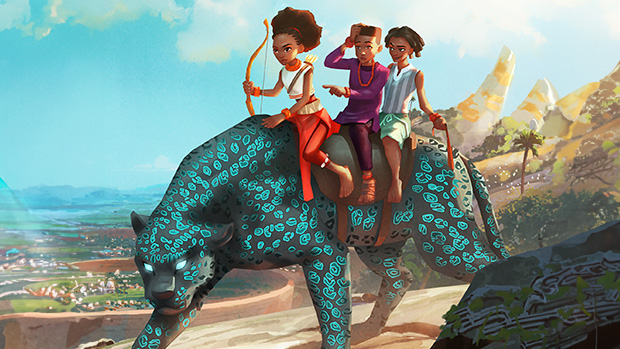Lion Forge on the need for originality and diversity
Stephanie Sperber, president and chief content officer of Lion Forge Entertainment, explains why original ideas are essential in ensuring a diverse kids’ content industry and how the economic crisis could help the company own its own IP.
 It has been a busy few months for US-based kids’ content company Lion Forge Entertainment, which has been ramping up its activities since its formation almost five years ago.
It has been a busy few months for US-based kids’ content company Lion Forge Entertainment, which has been ramping up its activities since its formation almost five years ago.
Since last July alone, it has set up a first-look deal with Nickelodeon Animation, partnered with Penguin Young Readers to develop TV and film projects based on books released by the children’s publisher, launched a sales division and forged a first-look pact with Nigerian creator Roye Okupe. Last month, the company also revealed plans to adapt Sarah Mlynowski’s Best Wishes tween book series into a live-action franchise.
All of this comes as Lion Forge prepares for the premiere on Warner Bros Dicovery’s Cartoon Network and Max of the much-anticipated animated series Iyanu: Child of Wonder, while also working on a wider slate of shows including animated series Bugtron and Chicka Chicka Boom Boom.
The company’s live-action slate, meanwhile, includes an upcoming series based on Rebel Girls – a franchise that produces books and podcasts focused on the biographies of women from all over the world and throughout history.
Lion Forge’s slate is balanced at about 50/50 when it comes to original ideas and content based on existing IP, according to president and chief content officer Stephanie Sperber, who stresses that solely focusing on known brands means creators from underrepresented backgrounds would miss out.
“We work purposely to bring in diverse creators who haven’t had the chance to work on those big, legacy brands or known IP, but who have really interesting stories. If we were only going to work on big known IP brands, it wouldn’t help us fulfil the mission of our company, led by the motto: ‘Diverse stories authentically told,’” Sperber says.
As a Black-owned company, diversity is at the heart of Lion Forge’s ethos. And Sperber says the market has reacted well to its diverse offering of content.
“The buyers are excited by the idea that we’re telling stories that are diverse, but are not trauma stories. We’re telling fun, commercial, global stories and bringing people into it that haven’t necessarily been given the opportunity to tell those stories, and the buyers are really responding to the talent we’re bringing to the table,” she says.

Lion Forge will premiere Iyanu: Child of Wonder on WBD’s Cartoon Network and Max
The exec adds, however, that more needs to be done to improve representation and inclusivity in the wider industry.
“The idea that Lion Forge is the only Black-owned animation studio of scale – I’m sure there are independents – is bonkers,” she says.
“There should be more diverse-owned and focused studios. The default when you’re thinking about who you should get to help write or design a show is to those people who’ve been in the industry for the last few decades who are great and talented, but they tend not to be an incredibly diverse crowd.”
Lion Forge’s goal for 2024 is to get out into the market with its slate of content, after what Sperber describes as an “awful” 2023 that was plagued by the strikes in the US. In the first quarter of this year, the company pitched around 12 different projects.
“It was really rough [during the strikes]. We’re based in LA; many of the writers we know are [members of the] WGA. It was really stifling and pretty bad. But now that’s over. As soon as the strike was over and into first quarter [of 2024], it’s been like the riches of writers falling from the sky. Everyone wants to get working,” the exec says.
“We took that time [during the strikes] to build out our creative slate. So we are ready to go and 2024 is about going to the marketplace,” she adds, noting that the company is placing a “special emphasis” on live action.
The strikes may be over, but the industry is still in an extremely tough place as it grapples with the ongoing global economic crisis. Lion Forge, however, hasn’t felt much economic pressure, Sperber says.
“As an industry, the money to invest has got tighter and harder to raise. We are in a position where we don’t feel that pressure. We know we can invest and we’ve been really wise about what we’re going to finance and what we’re going to sell as an original. So that hasn’t impacted us so much,” she says.
Meanwhile, Sperber argues that the buyers’ tightened purse strings could present opportunities to producers and distributors in a position to finance content themselves, who can then take the rights to the IP.
“It will calm down a little bit in the next couple of years, but we are ready. Our whole thesis is we can finance. Buyers who are reluctant to spend their original money, let us come in and take it as a licence. We’ll take the risk, we’ll finance it and then we’ll own the IP at the end of the day,” she says.
“What is valuable in the kids’ space is to be able to, in some or even half the cases, own your own IP. So if we can bring financing to it and own that as an asset 30% of the time, the value of Lion Forge will dramatically increase.”
Conversely, Sperber says she feels less certain about “the consolidation and reconfiguration of the entire entertainment platform,” in that “nobody knows what’s going to come next,” while constant changes in the people working at the platforms presents the biggest challenge.
She says: “The biggest challenge is the buyers. The people at the platforms change with such frequency that it is hard for any of us producers and sellers to know what a platform is looking for, as with that change, their mandates change.”








 It has been a busy few months for US-based kids’ content company Lion Forge Entertainment, which has been ramping up its activities since its formation almost five years ago.
It has been a busy few months for US-based kids’ content company Lion Forge Entertainment, which has been ramping up its activities since its formation almost five years ago.




























